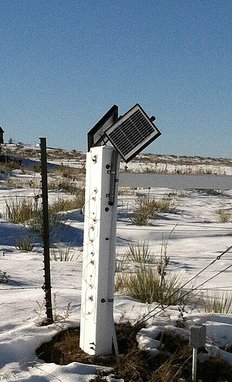 I am very interested in a better use of the electricity we use on this planet. I think energy production from non-fossil fuel sources will be important in the future, and I'm regularly examining the energy usage at my ranch, calculating the cost of wind, solar, and other energy production technologies to see if any of them are a good investment. I believe that our future will both require and consume more electrical energy. That's fine, but I think that we ought to be looking to be more efficient in how we use energy, which will require an effort to build and use more efficient devices.
I am very interested in a better use of the electricity we use on this planet. I think energy production from non-fossil fuel sources will be important in the future, and I'm regularly examining the energy usage at my ranch, calculating the cost of wind, solar, and other energy production technologies to see if any of them are a good investment. I believe that our future will both require and consume more electrical energy. That's fine, but I think that we ought to be looking to be more efficient in how we use energy, which will require an effort to build and use more efficient devices.
Many authors write articles and speak about techniques that you can use to build more efficient applications. The most popular sessions given by speakers and requested by attendees are those that deal with improving performance. Writing better code, troubleshooting issues, and increasing the efficiency of our systems are under our control seem to be the priorities for most IT workers that I know. Every time we build something a little better, it's a great win for the author.
Intel published an interesting article that talks about the impact that writing better code might have on energy usage in applications. Computers use different amounts of energy under different loads. More intensive computations use more power than the idle thread that occupies the CPU during low usage periods. I don't know how much power I'm using at my house for computing, but I plan on measuring it, especially after reading this post from someone that calculated his power consumption.
Power is becoming a more of an issue for many data centers. The cost is rising and becoming a significant percentage of the total expense of operation. While data professionals tend to work on server systems, which share the load from many clients and might not have much idle time, there still could be room for improvement. Writing better, more efficient code that requires less reads, less CPU cycles, can end up reducing the cost of operation. Maybe that's a reason to ask for a little larger training budget and learn how to write better, non-RBAR code (as Jeff Moden would say).
Whether better code could save a significant amount of electricity is hard to know, but in most cases, it doesn't take any more time or effort to write more efficient code than poor code: if you know how. You probably have plenty of reasons to learn to write better code, but here's one more. Writing better code might help you feel a little more green.
Steve Jones
The Voice of the DBA Podcasts
- Watch the Windows Media Podcast - 23.3MB WMV

- Watch the iPod Video Podcast - 18.2MB MP4

- Watch the MP3 Audio Podcast - 4.2MB MP3


The podcast feeds are available at sqlservercentral.mevio.com. Comments are definitely appreciated and wanted, and you can get feeds from there. Overall RSS Feed: ![]() or now on iTunes!
or now on iTunes! ![]()
Today's podcast features music by Everyday Jones. No relation, but I stumbled on to them and really like the music. Support this great duo at www.everydayjones.com.
You can also follow Steve Jones on Twitter:



